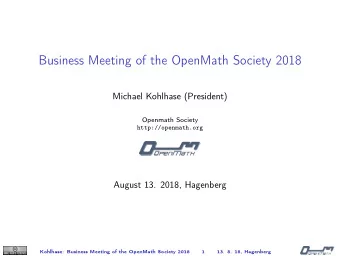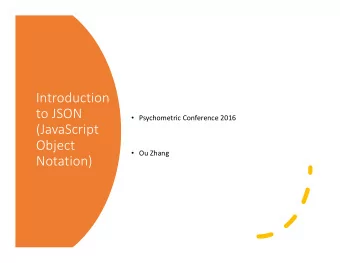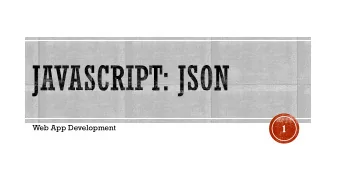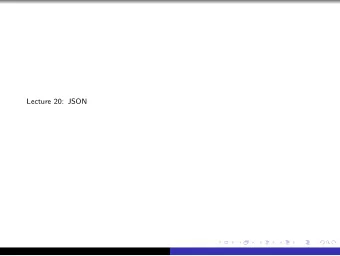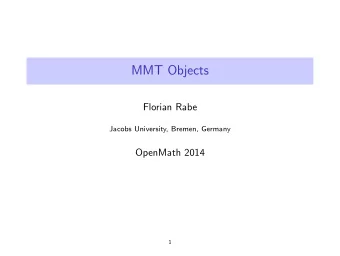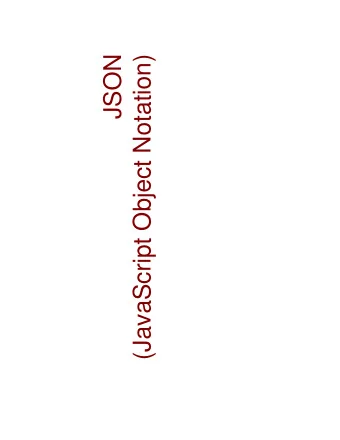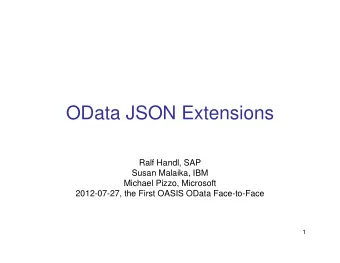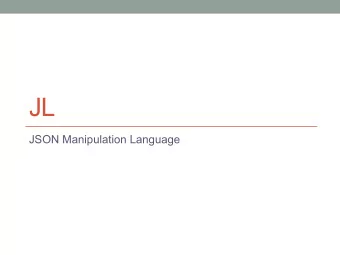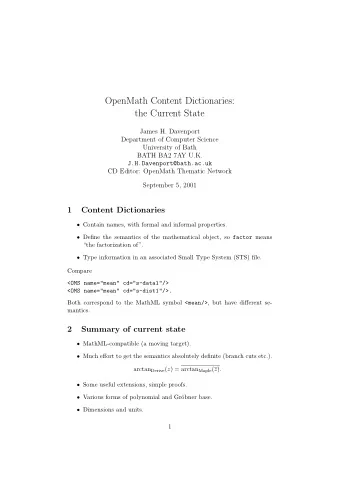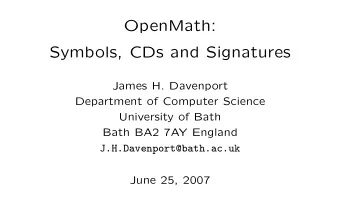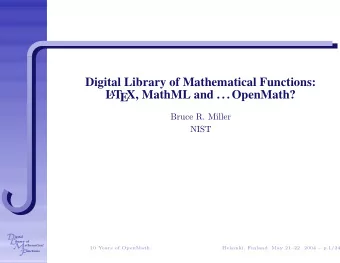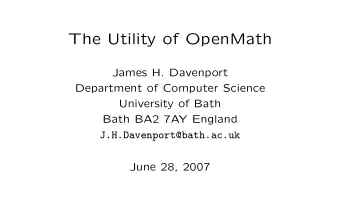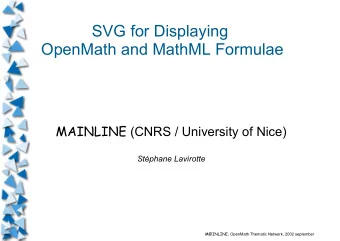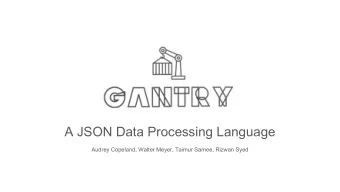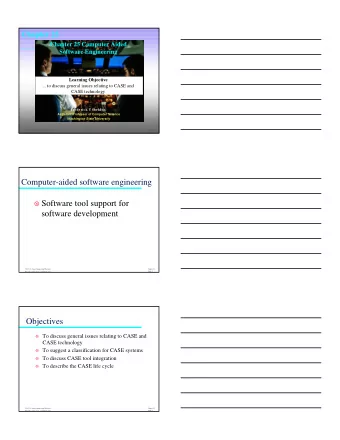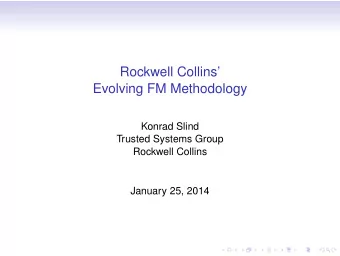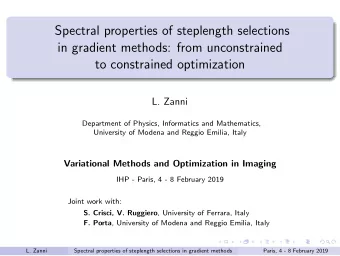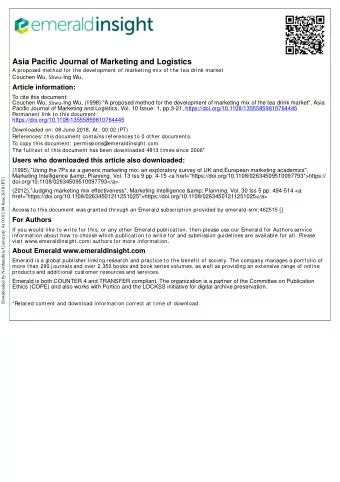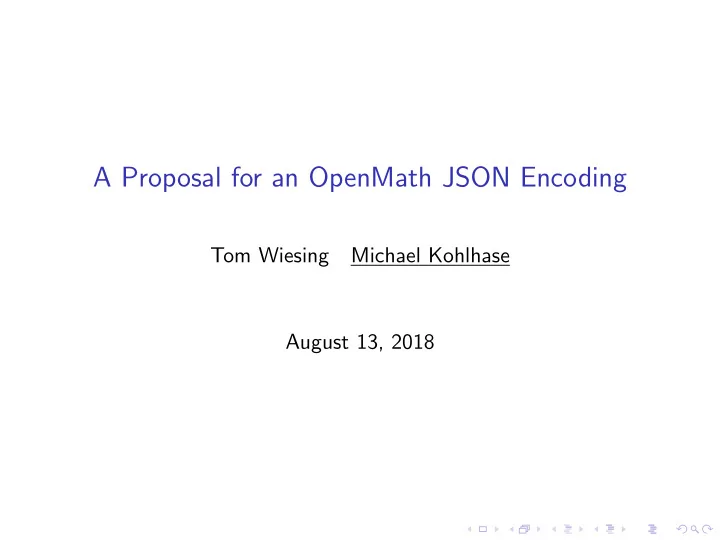
A Proposal for an OpenMath JSON Encoding Tom Wiesing Michael - PowerPoint PPT Presentation
A Proposal for an OpenMath JSON Encoding Tom Wiesing Michael Kohlhase August 13, 2018 Recap: The OpenMath Information Architecture OpenMath provides extensible standards for representing the semantics of mathematical objects and
A Proposal for an OpenMath JSON Encoding Tom Wiesing Michael Kohlhase August 13, 2018
Recap: The OpenMath Information Architecture ◮ OpenMath provides extensible standards for representing the semantics of mathematical objects and communicating them between software systems. ◮ The main encoding is based on XML ◮ XML has a convenient tree model ◮ XML is supported in many programming languages
Recap: The OpenMath Information Architecture ◮ OpenMath provides extensible standards for representing the semantics of mathematical objects and communicating them between software systems. ◮ The main encoding is based on XML ◮ XML has a convenient tree model ◮ XML is supported in many programming languages ◮ BUT: XML is not the only game in town. ◮ some communities/frameworks prefer the more lightweight JSON (especially in the Web services context) ◮ OpenMath may want to provide a JSON encoding to cater to these communities
What is JSON? ◮ JSON = J ava S cript O bject N otation ◮ lightweight data-interchange format ◮ subset of JavaScript (used a lot on the web) ◮ defined independently ◮ Primitive types ◮ Strings (e.g. "Hello�world" ) ◮ Numbers (e.g. 42 or 3.14159265 ) ◮ Booleans ( true and false ) ◮ null ◮ Composite types ◮ Arrays (e.g. [1, "two", false] ) ◮ Objects (e.g. {"foo": "bar", "answer": 42} )
Why an OpenMath encoding for JSON? ◮ an OpenMath JSON encoding would make it easy to use across many languages ◮ JSON support exists in most modern programming languages ◮ corresponding native types common ◮ serialization to/from JSON without external library ◮ some existing approaches for an OpenMath JSON encoding ◮ discussed / suggested on the OpenMath mailing list ◮ we will look at two examples here
XML as JSON ◮ Idea: Generically encode XML as JSON ◮ use the JSONML standard for this ◮ e.g. plus ( x , 5) corresponds to: [ "OMOBJ", {"xmlns":"http://www.openmath.org/OpenMath"}, [ "OMA", ["OMS", {"cd": "arith1", "name": "plus"}], ["OMV", {"name": "x"}], ["OMI", "5"] ] ]
XML as JSON (2) ◮ Advantages ◮ based on well-known XML encoding ◮ easy to understand based on it ◮ does not make use of JSON structures ◮ all attributes are encoded as strings, even numbers ◮ e.g. 1e-10 (a valid JSON literal) can not be used ◮ retains some of the XML awkwardness ◮ introduces unnecessary overhead ◮ e.g. some pseudo-elements (such as OMATP) are needed
OpenMath-JS ◮ OpenMath-JS ◮ an (incomplete) implementation of OpenMath in JavaScript ◮ developed by Nathan Carter for use with Lurch Math on the web ◮ written in literate coffee script, a derivative language of JavaScript ◮ e.g. plus ( x , 5) corresponds to: { "t": "a", "c": [ {"t": "sy", "cd": "arith1", "n": "plus"}, {"t": "v", "n": "x"}, {"t": "i", "v": "5"} ] }
OpenMath-JS (2) ◮ does make use of JSON native structures ◮ much better than JSON-ML ◮ small property names keep size of transmitted objects small ◮ comes with some problems ◮ hard to read for humans ◮ written for JavaScript , not JSON ◮ no formal schema
Towards an OpenMath JSON Formalization ◮ we need to write a new OpenMath JSON encoding ◮ combine advantages of the above two ◮ should be close to the XML encoding ◮ should make use of JSON concepts ◮ we want to formalize this JSON encoding ◮ to verify JSON objects ◮ not done by existing approaches ◮ comes with some positive side effects ◮ formalization of JSON ⇒ structure definition in most languages ◮ trivial to use advanced serialization tools ◮ e.g. Protocol Buffers , ZeroMQ ◮ we can use JSON Schema ◮ a vocabulary allowing us to validate and annotate JSON documents ◮ tools for verification exist
Towards an OpenMath JSON Formalization (2) ◮ JSON schema is often tedious to write and read ◮ especially when it comes to recursive data types ◮ but implementation of it still exist ◮ Idea: Write schema in a TypeScript, compile into a JSON schema ◮ TypeScript = JavaScript + Type Annotations ◮ easily writeable and understandable ◮ a compiler from TypeScript Definitions into JSON Schema exists ◮ We have done this, and will present some examples in the following slides
Towards an OpenMath JSON Formalization (3) ◮ Wrote a JSON Schema ◮ was written as described above ◮ we will give an overview how this looks below ◮ Wrote a translator from OpenMath XML to JSON (we have actually built two) 1. web demo on ( https://omjson.kwarc.info ) 2. as part of MMT (i.e. Scala) in the form of a RESTful API
General Structure of OpenMath objects ◮ represent each OM Object as a Hashmap: { "kind": "OMV", "id": "something", "name": "x" } ◮ kind attribute specifies the type ◮ called a type guard in TypeScript ◮ has the same names as elements in the XML encoding ◮ id attribute used for structure sharing ◮ like in xml ◮ referenced using OMR kind (we will come back to this later) ◮ the examples ◮ use TypeScript syntax (easily readable) ◮ omit the id attribute
Object Constructor - OMOBJ ◮ { "kind": "OMOBJ", /** optional version of openmath being used */ "openmath": "2.0", /** the actual object */ "object": omel /* any element */ } ◮ e.g. the number 3 { "kind": "OMOBJ", "openmath": "2.0", "object": { "kind": "OMI", "integer": 3 } }
Symbols - OMS ◮ { "kind": "OMS", /** the base for the cd, optional */ "cdbase": uri, /* any valid URI */, /** content dictonary the symbol is in, any uri */ "cd": uri, /** name of the symbol */ "name": name /* any valid symbol name */ } ◮ e.g. the sin symbol from the transc1 CD { "kind": "OMS", "cd": "transc1", "name": "sin" }
Variables - OMV ◮ { "kind": "OMV", /** name of the variable */ "name": name } ◮ e.g. the variable x { "kind": "OMV", "name": "x" }
Integers - OMI (1) ◮ integers can be represented in three ways ◮ as a native JSON integer ◮ as a decimal-encoded string (like in XML) ◮ as a hexadecimal-encoded string (like in XML) { "kind": "OMI", // // exactly one of the following // /* any json integer */ "integer": integer, /* any string matching ^-?[0-9]+$ */ "decimal": decimalInteger, /* any string matching ^-?x[0-9A-F]+.$ */ "hexadecimal": hexInteger }
Integers - OMI (2) ◮ e.g. − 120 represented in three ways: ◮ ◮ as a JSON integer { "kind": "OMI", "integer": -120 } ◮ as a decimal-encoded string { "kind": "OMI", "decimal": "-120" } ◮ as a hexadecimal-encoded string { "kind": "OMI", "hexadecimal": "-x78" }
Floats - OMF (1) ◮ floats can also be represented in three ways ◮ as a native JSON number ◮ using their decimal encoding (like in XML) ◮ using their hexadecimal encoding (like in XML) { "kind": "OMF", // // exactly one of the following // /* any json number */ "float": float, /* any string matching (-?)([0-9]+)?(\.[0-9]+)?([eE](-?)[0-9]+)? */ "decimal": decimalFloat, /* any string matching ^([0-9A-F]+)$ */ "hexadecimal": hexFloat }
Floats - OMF (2) ◮ e.g. 10 − 10 represented in three ways: ◮ ◮ as a JSON float { "kind": "OMF", "float": 1e-10 } ◮ as a decimal-encoded string { "kind": "OMF", "decimal": "0.0000000001" } ◮ as a hexadecimal-encoded string { "kind": "OMF", "hexaecimal": "3DDB7CDFD9D7BDBB" }
Bytes - OMB (1) ◮ bytes can be represented in two ways ◮ as an array of bytes ◮ as a string encoded in base64 { "kind": "OMB", // // exactly one of the following // /** an array of bytes where a byte is an integer from 0 to 255 */ "bytes": byte[], /** a base64 encoded string */ "base64": base64string }
Bytes - OMB (2) ◮ e.g. the ascii bytes of hello world represented in two ways: ◮ ◮ as a byte array { "kind": "OMB", "bytes": [ 104, 101, 108, 108, 111, 32, 119, 111, 114, 108, 100 ] } ◮ as a base64-encoded string { "kind": "OMB", "base64": "aGVsbG8gd29ybGQ=" }
Strings - OMSTR ◮ { "kind": "OMSTR", /** the string */ "string": string } ◮ e.g. { "kind": "OMSTR", "string": "Hello�world" }
Applications - OMA (1) ◮ { "kind": "OMA", /** the base for the cd, optional */ "cdbase": uri, /** the term that is being applied */ "applicant": omel, /** the arguments that the applicant is being applied to. Optional and assumed to be empty if omitted */ "arguments"?: omel[] }
Recommend
More recommend
Explore More Topics
Stay informed with curated content and fresh updates.
